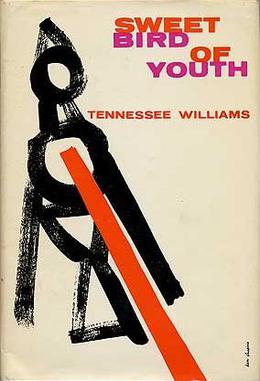Tennessee Williams' play Sweet Bird of Youth is set in segregationist small town Florida in the 1950's. First performed in New York in 1959, it deals with themes of jealousy, ageing, gender, sex and race in a direct way that must have been ground breaking at the time and yet many of the issues raised still simmer today.
Several of these themes are played out in the relationship between the play's two main characters - small town gigolo Wayne Chance and former star come on hard times - Alexandra del Lago, the latter the subject of a cracking performance by Kim Cattrall. Both use each other - she uses him in order to feel young, beautiful and desirable again, whilst he uses her in a vain attempt to secure access to break into the film world. Cattrall shines in the scenes where she laments the judgement of the world on an ageing female star. It doesn't matter how good her performance as an actress is because the screen shows a woman past her prime in a world where youth is everything. She describes the terror of exposure, saying "The screen's a very clear mirror. There's a thing called a close-up. the camera advances and you stand still and your head, your face, is caught in the frame of the picture with a light blazing on it and all your terrible history screams while you smile..."
The much younger Chance is also concerned about the passage of time - pushing 30 and nowhere near achieving his ambition of stardom, he concentrates all of his efforts on winning back his former girlfriend - the wonderfully named Heavenly Finlay, daughter of local corrupt and racist politician Boss Finlay. Chance believes Heavenly to be his redemption and his future. And here lies another key theme of the play - the danger of illicit sex. Chance and Heavenly are former lovers. Boss is obsessed with "purity" and blames Chance for his daughter's "ruin". This obsession extends to racial purity and the play drives home the often terrifying, virulently racist atmosphere of much of this period.
Williams describes sex in interesting terms - as connected to illness, as being threatening and as a commodity to be bought and sold. Even Boss is not exempt from concerns about sex when he hears that there is gossip in the town about his decline in prowess as he grows older. Williams himself
There are no sympathetic characters in this play. The leads rely on drugs and alcohol to cope with their inadequacy. Boss's interest in purity is a sham. All of the characters use each other in different ways. Director Marianne Elliott and designer Rae Smith have created an atmosphere at the Old Vic that transport the audience back to the period in which the play is set. The hotel room scenes are particularly convincing and the claustrophobia of the room and of small town America (or anywhere) during the period is palpable. A great deal of the play takes place in that hotel room - that's almost three hours, but the performance is so gripping that this considerable amount of time slips away very quickly - further illustrating Williams' theme about the passage of time.
Despite the darkness of the play, there are moments of humour. Cattrall's change of mood from hopeless, defeated monster to monster resurgent is both convincing and hilarious - demonstrating very nicely the shallowness of the world in which her character operates. And look out for a nice performance from Lucy Robinson as Miss Lucy who also produces a few laughs in her early scenes. Excellent performances also from Owen Roe as Boss Finlay and Seth Numrich as Chance Wayne. The play runs until the end of August. It was a full house last night so don't leave it too late and miss it!
Incidentally, the theatre is looking beautiful and he auditorium truly stunning. What a shame to spoil things somewhat with inadequate toilet provision. There was even a queue for the men's toilets last night whilst the queue for the women's stretched across at least half of the downstairs bar. London theatre is not cheap...how about sorting the comfort facilities?

This comment has been removed by the author.
ReplyDelete